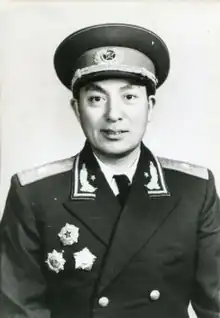Li Guang (born 1914)
Li Guang (Chinese: 黎光; pinyin: Lí Guāng; 5 November 1914 – 27 December 2020) was a founding major general (Shaojiang) of the People's Liberation Army (PLA) of China. He took part in the Red Army in 1933 and joined the Communist Party of China in 1935.[1][2]
Li Guang | |
|---|---|
 | |
| Native name | 黎光 |
| Birth name | Li Guangyu (黎光裕) |
| Born | November 5, 1914 Yilong County, Sichuan, China |
| Died | December 27, 2020 (aged 106) Nanjing, Jiangsu, China |
| Allegiance | |
| Service/ | |
| Years of service | 1932-2020 |
| Rank | |
| Battles/wars | Second Sino-Japanese War Chinese Civil War Korean War |
| Awards | Red Star Medal (1st Class) |
| Alma mater | Counter-Japanese Military and Political University Nanjing Military Academy |
| Spouse(s) | Liu Dangping Li Shuren |
| Children | 7 |
Biography
Li was born Li Guangyu (黎光裕) into a poor family in Yilong County, Sichuan, on November 5, 1914.[1][2] On August 23, 1933, the Red Army liberated the downtown Yilong County.[2] After the Red Army liberated Li's hometown Xinzheng in early September, he had applied to join the army.[2] At the age of 18, he was appointed a platoon leader of 2nd Company of the Independent Battalion and broke up a gang of bandits and landlords deep in the mountains.[2] In October 1933, under the command of Chiang Kai-shek, Liu Xiang assaulted the Sichuan-Shaanxi revolutionary base, he fought with the Kuomintang army in Cangxi County and was wounded in the leg.[2] At the end of March 1935, he participated in the Long March.[2]
Second Sino-Japanese War
During the Second Sino-Japanese War, he was a company commander in 129th Division of the Eighth Route Army.[1][2] He was wounded in the battle with the Japanese at Yangmingbao airport.[2] He recuperated in Yan'an General Hospital for two months after a bullet went from his left jaw through right ear.[2] After recovery, he entered the Counter-Japanese Military and Political University.[2] In October 1938, he was sent to Jizhong Military Area in north China's Hebei province.[2] He fought guerrilla wars with the Japanese army in the Baiyangdian area.[2]
Chinese Civil War
After the surrender of Japan, Commander-in-chief Zhu De ordered Li to capture Zhangjiakou.[2] On August 20, 1945, Zhangjiakou was occupied and the troops of Fu Zuoyi suffered a crushing defeat.[2] Afterwards, he successively participated in the Battle of Zhengding, Battle of Wuchi, Battle of Zhengtai, Battle of Qingfengdian during the Chinese Civil War.[1][2] In 1949, his troops took part in the siege of Fu Zuoyi after the liberation of Baoding.[2]
PRC era
After the establishment of the Communist State, he was appointed division commander of the 198th Division of 66th Corps.[2] Soon after, he was accepted by Nanjing Military Academy (now PLA Military Academy).[2] In July 1952, the Chinese government commissioned him as division commander of 202nd Division of the 68th Corps.[2] He was present at the Battle of Kumsong and Summer Offensive Campaign during the Korean War.[2] After war, he was promoted to deputy commander of the 68th Corps.[2] He attained the rank of major general (Shaojiang) in 1955. In 1956, he was transferred to the coastal province Jiangsu and appointed commander of Lianyungang Fortress.[2] He was division commander of 15th Division of the Wusongkou Garrison in 1958, and held that office until 1962.[2] Since 1962 he successively served as deputy director and director of Engineering Command of the Nanjing Military Region.[2] In 1978 he became a consultant of Nanjing Military Region.[2]
Death
He died of illness in Nanjing, Jiangsu, on December 27, 2020, aged 106.[3]
Personal life
He was twice married. His first wife named Liu Dangping (刘荡平) and his second wife named Li Shuren (李淑仁). He had three sons and four daughters.[1]
Awards
 Order of August the First (3rd Class Medal) (1955)[3]
Order of August the First (3rd Class Medal) (1955)[3] Order of Independence and Freedom (2nd Class Medal) (1955)[3]
Order of Independence and Freedom (2nd Class Medal) (1955)[3] Order of Liberation (2nd Class Medal) (1955)[3]
Order of Liberation (2nd Class Medal) (1955)[3]- Red Star Medal (1st Class)[3]
References
- Bu Jinbao (卜金宝) (21 June 2020). 百岁将军黎光的传奇人生. 81.cn (in Chinese). Retrieved 3 January 2021.
- Yue Huairang (岳怀让) (27 December 2020). 106岁开国少将、原南京军区工程兵主任黎光逝世. thepaper.cn (in Chinese). Retrieved 3 January 2020.
- Xia Yang (夏阳) (28 December 2020). 痛心!又一开国将星陨落,目前仅存6颗. qq.com (in Chinese). Retrieved 3 January 2021.